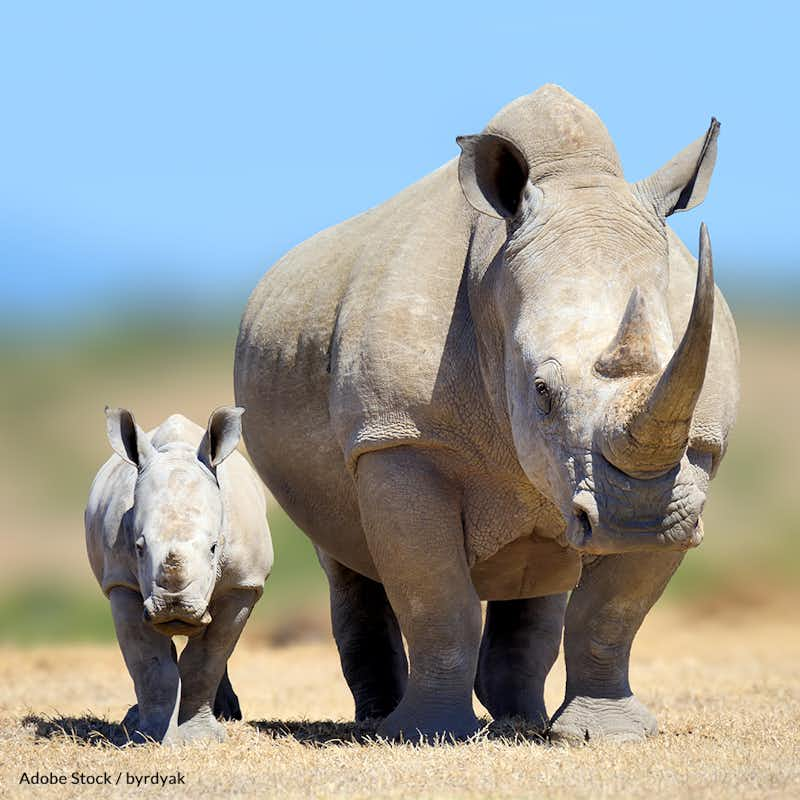Ban The Rhino Horn Trade In South Africa
33,841 signatures toward our 50,000 Goal
Sponsor: The Animal Rescue Site
About three rhinos a day are killed by poachers for their horns. Sign and put an end to the rhino horn trade in South Africa!

Rhinoceroses are perilously close to extinction, and without a ban on the rhino horn trade, they may disappear forever.
The international trade in rhino horn, regulated by the Convention on International Trade of Endangered Species (CITES), has been banned since 19771. That means international trade is illegal, but individual countries may write their own laws that regulate the sale of rhino horn within their boundaries.
Many different countries have followed CITES' lead and endorsed an outright ban on the domestic rhino horn trade, but South Africa has taken a different approach.
A South African constitutional court struck down the ban on the sales of rhinoceros horns2 in 2017 after poaching incidents were thought to have been reduced to negligible number. Actually, the number of rhinos being being poached has risen. In the four-year span between 2008 and 2012, rhinos killed by poachers jumped from 83 to 6883. There were 1,215 incidents of rhino poaching in 2014, while the number of rhinos killed from 2014 to 2017 has been between 1,000 and 1,200 annually, equivalent to approximately three rhinos per day4.
Currently, almost 70 percent of the world's rhino population is located in South Africa, where a ban on the sales of rhino horns could make the greatest impact3.
"If these regs are promulgated, we will see a significant rise in poaching, as poachers use the significant loopholes to cater to the increased demand for horn in the Far East," Morgan Griffiths, of the Wildlife and Environment Society of South Africa.
Rhino horns are so highly sought after by poachers because of the amount buyers in China and Vietnam are willing to pay for them. Some rhino horns will fetch up to $300,000 before they are turned into spurious "remedies" for everything from erectile dysfunction to hangovers3.
"Rhino horn is in high demand for its use in traditional Asian medicine, though rhino advocates argue it has no medicinal value," Merrit Kennedy reported for NPR. "Demand has driven up the price -- a French zoo that was victim to a recent poaching attack said that in 2015, a kilogram of rhino horn sold on the black market for nearly $54,000."
Legalizing the rhino horn trade has not helped prevent poaching, In fact, it has only increased the killing of rhinos for their horns1.
Our world's remaining rhinos are disappearing, and if a ban on the sale of rhino horns is not soon put in place in South Africa, they may disappear forever.
Sign the petition below and stand up for rhinos!
- Save the Rhino (21 December 2018), "A legal trade in rhino horn."
- Bale, R. (April 5, 2017), "Breaking: Rhino Horn Trade To Return in South Africa."
- Guilford, G. (May 15, 2013), "Why Doest A Rhino Horn Cost $300,000? Because Vietnam Thinks It Cures Cancer And Hangovers."
- Merrit Kennedy, NPR (13 March 2017), "South Africa Considers Legalizing Domestic Rhino Horn Trade."
The Petition:
Dear Constitutional Court of South Africa,
Without a ban on the buying of selling of rhino horns in South Africa, these incredible animals will soon go extinct.
Since so many of the world's rhino population are found in your very own country, keeping the rhino horn trade illegal will not only keep the animals safe, but it will help to discourage other countries from believing legalization of the trade is viable.
Now that COVID-19 pandemic restrictions are being lifted, poaching is experiencing a massive rise and rhinos are in more danger than ever before. We are losing hundreds of rhinos every year, sometimes as many as three rhinos per day.
Allowing any sort of rhino horn sales, whether or not it is considered "sustainable," invites poaching. The only way to protect these magnificent creatures is by banning the trade of their horns.
I implore you to stand up for the rhino and ban the rhino horn trade in South Africa today.
Sincerely,